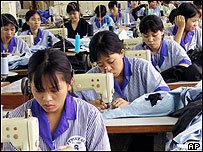 Tuesday, August 22, 2006
Tuesday, August 22, 2006By Yun Samean and Erik Wasson
THE CAMBODIA DAILY
With formal negotiations over the minimum wage in the garment industry looming, employers and unions outlined their bargaining positions on Monday.
On one side, the Garment Manufacturers Association issued a press release stating that any raise over the $45 monthly minimum wage could damage the industry. On the other, unions said they were demanding $82 for all permanent workers and a minimum monthly wage of $100 for skilled workers. Talks are set to begin Sept 11.
To make its case, GMAC's press release cited minimum-wage data compiled in a May report issued by the Cambodian Institute for Development Study. It noted that the minimum garment workers' wage is a mere $20 a month in Bangladesh, $40 in Laos and $31 in Sri Lanka—all well below Cambodia's prevailing wage.
"When garment workers in other countries are willing to accept a lower reference minimum wage, how can Cambodian garment workers demand more from an already high reference minimum wage?" the statement asks.
GMAC acknowledged that it is in negotiations with 15 union federations including the outspoken Free Trade Union. It asked that unions focus on finding ways to improve worker productivity, because, it said, Cambodian jobs are already at risk due to relentless competition. The statement goes on to note that most workers make more than $45 due to piece rate calculations, and that an increase in the minimum wage will not raise the wages of these senior employees.
FTU Deputy Secretary General Yan Roth Keo Peisei said that on Sunday 22 federations, including all 15 negotiating with GMAC, agreed to push for the $82 base and $100 skilled minimum wages. FTU Secretary-General Mann Seng Hak said that inflation has made an increase in the minimum necessary.
He noted that in Thailand minimum wages are higher than in Cambodia, a fact supported by the study referenced by GMAC. According to the study, Thailand's minimum wage, based on region, ranged from $74 to $94 a month in 2003.
On one side, the Garment Manufacturers Association issued a press release stating that any raise over the $45 monthly minimum wage could damage the industry. On the other, unions said they were demanding $82 for all permanent workers and a minimum monthly wage of $100 for skilled workers. Talks are set to begin Sept 11.
To make its case, GMAC's press release cited minimum-wage data compiled in a May report issued by the Cambodian Institute for Development Study. It noted that the minimum garment workers' wage is a mere $20 a month in Bangladesh, $40 in Laos and $31 in Sri Lanka—all well below Cambodia's prevailing wage.
"When garment workers in other countries are willing to accept a lower reference minimum wage, how can Cambodian garment workers demand more from an already high reference minimum wage?" the statement asks.
GMAC acknowledged that it is in negotiations with 15 union federations including the outspoken Free Trade Union. It asked that unions focus on finding ways to improve worker productivity, because, it said, Cambodian jobs are already at risk due to relentless competition. The statement goes on to note that most workers make more than $45 due to piece rate calculations, and that an increase in the minimum wage will not raise the wages of these senior employees.
FTU Deputy Secretary General Yan Roth Keo Peisei said that on Sunday 22 federations, including all 15 negotiating with GMAC, agreed to push for the $82 base and $100 skilled minimum wages. FTU Secretary-General Mann Seng Hak said that inflation has made an increase in the minimum necessary.
He noted that in Thailand minimum wages are higher than in Cambodia, a fact supported by the study referenced by GMAC. According to the study, Thailand's minimum wage, based on region, ranged from $74 to $94 a month in 2003.

























1 comment:
Why do Cambodian workers have to be slaves to the world? Cambodian people don't have a job? Now tell me what has AH HUN SEN been doing for past 30 years!
Post a Comment